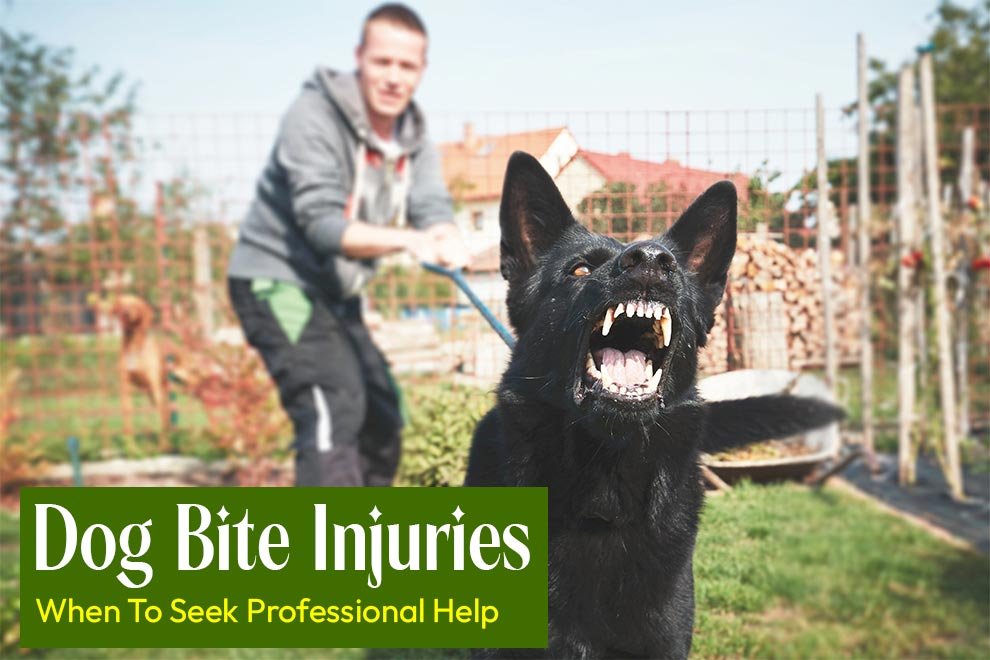Beyond the immediate physical pain, a dog bite can trigger a cascade of worries. Will this get infected? Will I need stitches? Is there a risk of rabies? These anxieties can be overwhelming, especially in the heat of the moment. Dog bites can leave emotional scars too – fear, anxiety, even nightmares. For children, the experience can be particularly traumatic.
This guide is designed to help you navigate the aftermath of a dog bite. It’ll explore everything from first aid to when it’s time to seek professional help and even touch on the legal and emotional aspects. Because when it comes to dog bites, being informed can make all the difference.
Understanding the Severity of Dog Bite Injuries
Some dog bites might just be a quick nip that leaves a minor scratch, while others can result in deep puncture wounds, torn flesh, or even broken bones. The severity hinges on several factors.
The Dog
A large breed, like a German Shepherd, can inflict more damage than a Chihuahua simply due to size and jaw strength. But even small dogs can cause serious harm, especially to vulnerable areas like the face or hands.
The Bite Location
Bites to the face, neck, or hands are particularly concerning. They can lead to complications like nerve damage, scarring, or loss of function.
The Bite’s Force
A playful nip is one thing, but a full-on attack with shaking and thrashing can cause extensive tissue damage.
Your Health
Children, the elderly, and people with weakened immune systems are at a higher risk of complications from dog bites, even if the bite itself seems minor.
The consequences of a dog bite can extend far beyond the physical wounds. Medical bills, lost wages, emotional trauma – the impact can be overwhelming. In such cases, it’s essential to know your rights. Depending on the circumstances, the dog’s owner may be held liable for your injuries. If you’re in Utah and facing this situation, seeking guidance from a legal professional specializing in dog bite cases might be beneficial. A simple online search for a ‘looking for Utah dog bite lawyer for dog owner liability‘ can connect you with experts who can help you understand your options and potentially seek compensation for your suffering.
Immediate Steps To Take After a Dog Bite
Taking swift, decisive action can make a real difference in minimizing the damage and preventing complications. Here’s your action plan:
Stop the Bleeding
Grab a clean cloth or towel and apply firm pressure to the wound; if the bleeding is heavy, elevate the injured area above heart level if possible. Remember, most dog bites don’t result in major blood loss, so stay calm, focus on applying pressure, and help will arrive soon.
Clean the Wound
Once the bleeding is under control, gently wash the bite with mild soap and warm water to help flush out any dirt or bacteria that could cause infection. Avoid using harsh antiseptics like alcohol or hydrogen peroxide, as these can damage tissue and hinder the healing process.
Assess the Situation
If it’s just a small puncture or scratch and you know the dog is vaccinated, basic first aid and close observation might suffice. However, deep wounds, heavy bleeding, bites to the face or hands, or any uncertainty about the dog’s vaccination status are all red flags that demand immediate medical attention.
Even if the bite seems minor, infection is always a possibility. Keep a close eye on the wound for any signs of redness, swelling, pus, or increasing pain. If you have any doubts at all, don’t hesitate to seek professional help.
When To Seek Professional Medical Help
While some dog bites can be managed with basic first aid, others require immediate professional medical attention.
Seek medical attention immediately if:
- The bite is severe: This includes deep punctures, lacerations, or crush injuries that may require stitches, surgery, or other specialized care.
- The bleeding is heavy and doesn’t stop with direct pressure: Significant blood loss can lead to shock and other serious complications.
- The bite is on the face, hands, or genitals: These areas are more prone to infection and may require specialized treatment to minimize scarring and functional impairment.
- The victim is a child, elderly person, or someone with a weakened immune system: These individuals are more vulnerable to infections and complications from dog bites.
- The dog’s vaccination status is unknown, or the dog is suspected to have rabies: Rabies is a fatal disease, and post-exposure prophylaxis (PEP) must be administered as soon as possible.
- There are signs of infection: This includes increasing redness, swelling, pain, pus, or fever.
Early medical intervention can significantly reduce the risk of complications and promote faster healing. So, don’t hesitate to seek help if you have any concerns about a dog bite.
Legal and Insurance Considerations
In many places, dog owners are held responsible for their pet’s actions. This means they could be liable for your medical bills, lost wages, and even pain and suffering caused by the bite. If you’re facing a hefty medical bill or struggling to return to work due to your injuries, it’s wise to explore your legal options.
Your own health insurance may cover some of the medical costs associated with a dog bite, but it’s worth checking your policy for specifics. In some cases, the dog owner’s homeowner’s or renter’s insurance might also come into play.
Don’t hesitate to seek legal advice if you’re unsure about your rights or how to proceed. An experienced personal injury lawyer can guide you through the process, help you understand the complexities of dog bite laws, and advocate for your best interests.
An experienced personal injury lawyer can guide you through the process, help you understand the complexities of dog bite laws, and advocate for your best interests.There are legal resources and support available that offer help for victims of aggressive dogs who have suffered physical and emotional harm.
Emotional and Psychological Support
The shock, fear, and anxiety associated with the attack can linger long after the physical wounds have healed. Some people may develop a fear of dogs or experience flashbacks and nightmares. Others may struggle with feelings of anger, helplessness, or guilt.
It’s important to recognize that these emotional and psychological effects are normal and valid. Don’t be afraid to reach out for support. Talking to a therapist, counselor, or support group can help you process your emotions and develop coping mechanisms.
Final Thoughts
A dog bite is a jarring experience. But there are resources and support available to help you navigate the physical, emotional, and legal aftermath. If needed, reach out to professionals, whether a medical expert, a legal advisor, or a mental health counselor. Above all, don’t let a single incident overshadow your love for animals or your enjoyment of the outdoors.










